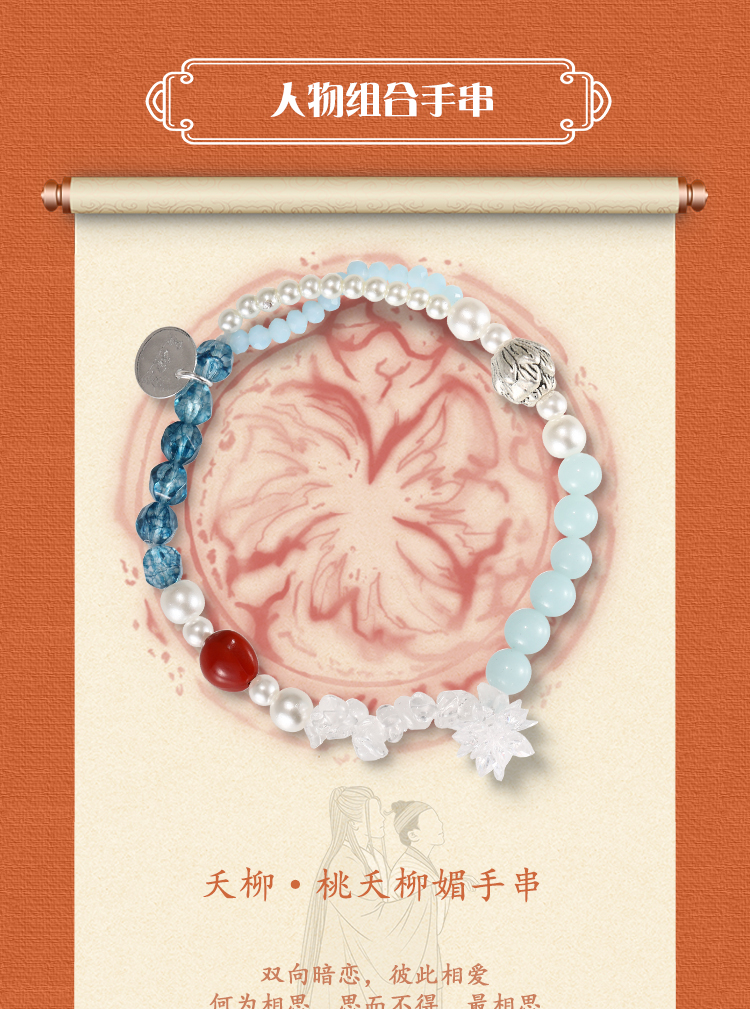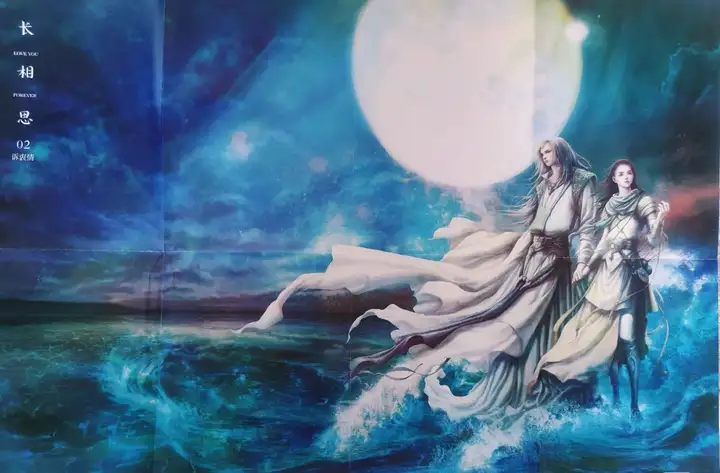You love to make poison, and I am the only one in the world who can taste the poison you make; you love to swim, and I will take you to the sea, which is our common home; you yearn for freedom, and I will go out and swim with you in the world of heaven and earth. To others, we are passers-by A, B, and C, but to each other, we are people who can be recognized by the other party at a glance even if we change our identities and appearances.
Sc:小观园
I created this thread specifically to post Yaoliu's love sickness.
"PLEASE DO NOT LEAVE COMMENTS"
I hope you guys like it.
If you want to discuss, I happily encourage you to visit our other threads, there you will have lots of fun discussion with friends!!
The origin and intention of "Sauvignon Blanc"
The following are quoted from Tong Hua’s original words
1. About Zhuanxu
<Jin Yong's "Flying Fox in the Snow Mountain" made many readers remember Mrs. Hu. After her husband died, she committed suicide. The love she followed through life and death was very soul-stirring.
I was also very touched and liked this woman very much, but even when I was young, I still had a doubt. She committed suicide. What will happen to her child? How should a child whose parents are dead live? Even if the most famous hero in the world is entrusted to take care of it, so what? Who in this world can replace his parents? (It turns out that Hu Fei Sure enough, he has gone through hardships)
I deeply disapprove of Mrs. Hu Yidao's suicide. So, there was my cousin and his mother. Even though my cousin grew up, he still couldn't escape the shadow of the knife that his mother stabbed him to death. He would always be fighting against the shadow of that knife in his life. As a wife, sharing life and death with her husband is a touching choice. But as a mother, now that she has given birth to a child, she must be responsible for her child. >
Note: This passage tells the origin of Zhuanxu and Zhuanxu’s mother.
2. About Xiaoyao and Xiangliu
<So, in comparison, what moved me more was Wu Xuanshuang written by Liang Yusheng. After Li Yi died, the scene of her taking Li Yi's children and walking step by step in the wind and snow will always be imprinted in my heart. Her love for Li Yi was deep and transcended her own life, but she chose to live to take care of Li Yi's children.
(These are all stories I read many years ago, but as I write this, I suddenly realize that I can’t remember Mrs. Hu’s name, I just remember that she is Hu Yidao’s wife, but I clearly remember Wu Xuanshuang’s name, and it seems that I can’t remember her name. It shows something, a woman attaches her life to a man, while the other woman lives her own life no matter how strong the love is.)
"Sauvignon Blanc" conveys a kind of "raw" emotion. I always feel that in this world, love is soul-stirring, but it is not everything in life. Family, friendship, ideals, responsibilities... People have all kinds of ties in the world, and there is also a lot of happiness that does not come from love.
<Sauvignon Blanc is because of deep love, because it cannot be obtained, and because it cannot be forgotten. However, I am willing to carry this feeling and live well. Life is one encounter and parting after another, it is forgetting and beginning again and again. You've been here, you've gone. Even though I miss you so much, I still smile when I see the beautiful rainbow. >
Note: This passage clarifies the concept of the love line in "Sauvignon Blanc" - a "raw" feeling. The heroine Xiaoyao in "Sauvignon Blanc" is "Wu Xuanshuang" rather than "Mrs. Hu". After Xiang Liu's death, Xiao Yao is willing to live well with this feeling of "deep love, unavailable, and unforgettable" - "You have been here, you have left. Even though lovesickness is difficult to understand, I will still watch When you see a beautiful rainbow, smile.”
<The length of life is limited and we cannot control it, but a good lover can increase the breadth and depth of life. >
Note: This is the view of love that Tong Hua wants to express through this book. Xiang Liu and Xiao Yao increase the breadth and depth of each other’s lives.
3. About Tu Shanjing
<There is another product of emotion in "Sauvignon Blanc". Xidu Ouyang Feng, who was born in Baituo Mountain, is the most brilliant figure in the martial arts world. Ouyang Ke is his and his sister-in-law's child. In Wong Kar-Wai's film, this afterimage becomes Maggie Cheung's peerless elegance and Leslie Cheung's drunken dreams of life and death. Across the world, I can't forget it even if I want to. But where is Xi Du’s brother? Where is the owner of White Camel Mountain? No one cares, and he doesn’t even have a name. When I was listening to "Jin", I was thinking about the Ouyang man whose name is unknown on Baituo Mountain. He married a woman who didn't love him. Why? Ouyang Feng missed the woman on White Camel Mountain, but he never thought of visiting his eldest brother. Why? That woman could ask someone to deliver a can of wine to Ouyang Feng. Here, Ouyang Feng's child can be born. He is the master of White Camel Mountain on White Camel Mountain, but apparently he has never really stopped him...
A little thought floated from Baituo Mountain to Qingqiu. There are Jing, Hou and Yiying. I have been thinking that if during Gaoxin's Lantern Festival, the man rowing out on a pole of spring water and half a stream of flowers in the shadow of flowers was really Jing, not Hou, Yiying and Jing might also be a good couple. Although Yiying was planning every step of the way, when she heard the news of Jing's death, she put aside all her plans. Regardless of the opposition of her family and the eyes of the world, she put on her wedding dress, flew thousands of miles, and climbed Qingqiu Mountain alone. Her ambition was to kill Kill Hou to avenge Jing. It's just, just...the man who came with a lantern in the dim night. Oh it's you! >
Note: This passage talks about the origins of Tushan Jing, Tushan Hou, and Fangfeng Yiying. It also shows that if it weren't for Tushanhou's calculation, Tushan Jing and Fangfeng Yiying might have been a good couple. In the book, when Tu Shanjing proposed to Xiaoyao, it was also clearly written that before being framed by Tu Shanhou, the wife his mother chose for him was the one he had longed for.
<Question: Where did Shiqi first discover that Xiaoliu was a girl?
Tong Hua answered: He knew that Xiao Liu was a transformed form before, but he was so despondent at that time that he didn't care about anything. Until Xiao Liu saw him blushing while taking a bath, he...well...died My heart skipped a beat...>
Note: This paragraph shows why Tu Shanjing can't leave Xiaoyao - Xiaoyao helped him regain his self-esteem as a man.
4. About the growth line
<To all strong people: Sufferings become sufferings only because those who encounter them are defeated. And we defeated suffering, crushed it into pieces, kneaded it into our own bodies, and turned it into our own strength. Therefore, we never regard suffering as suffering. >
Note: This passage clarifies the concept of growth line.
5. About the ending
<The ending of "Sauvignon Blanc" is not a tragedy, but it is said that I have no credibility. They say that my definition of tragedy is different from others...>
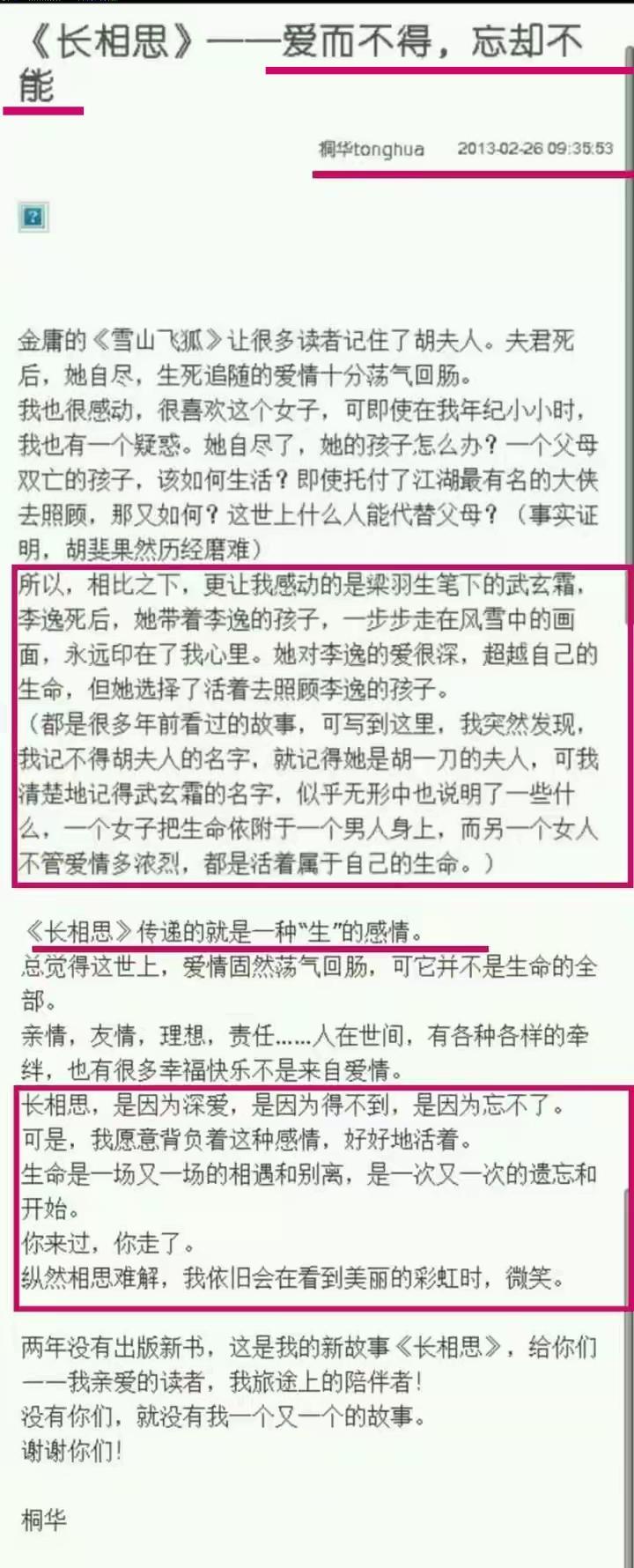 sc:小观园
sc:小观园
From the perspective of literary appreciation : "Sauvignon Blanc" from three aspects: plot line, writing techniques, and conception.
Three plot lines: story line, love line, growth line
Storyline: Zhuanxu’s journey to becoming an emperor. From Zhuan Xu ascending to the throne, and then gradually unifying the wilderness, the story development of the entire novel revolves around Zhuan Xu.
Love line: Xiaoyao and Xiang Liu’s love. The whole book tells the love story of Xiaoyao and Xiangliu from meeting and missing each other to falling in love and cherishing each other, and then from accompanying each other to forgetting and remembering each other. The final ending is that Xiangliu died in the battlefield, and Xiaoyao carried Xiangliu's love on his back. Deep love, live well.
Growth line: Xiaoyao’s self-salvation. Xiaoyao has never been able to get out of the shadow of her original family. Under the double obstacles of Tu Shanjing and Zhuanxu, she gradually lost her clarity and freedom. During this process, Xiaoyao was confused and even thought about giving up her life. But in the end, Xiaoyao did not give up searching. Self, Tu Shanjing and Zhuan Xu also "fell into internal fighting, one died and the other was injured." Xiaoyao succeeded in nirvana with the help of Xiang Liu.
Each of these three lines is more obscure than the last, and they are intertwined with light and dark, such as the love line. What is in the light is Xiaoyao's love for Xiangliu released through Tu Shanjing, and what is in the dark is Xiaoyao and Xiangliu's unspeakable love for each other. . Therefore, the book "Sauvignon Blanc" can also be divided into two lines: light and dark.
writing techniques
So, hidden lines, hidden lines, if there is no hint, it will become wireless. How to hint? Various writing techniques are used in the book to imply: "Gray lines of grass and snakes, veins running thousands of miles", "Spring and Autumn brushwork", and various expression techniques.
"Gray threads of grass and snakes, hidden veins for thousands of miles":
The so-called "grass snake gray line" refers to the snake walking in the grass, its tracks can be seen, and the gray line left on the paper, its veins can be discerned, which is a metaphor for things leaving vague clues and signs that can be found.
The so-called "the gray line of grass and snakes, the hidden pulse is thousands of miles away" means that before an event happens, the author has already written some signs of its occurrence (i.e., foreshadowing), so that people will not feel surprised about it. Therefore, although the author's pen seems to be writing "A", he can inadvertently write "B", so that the plot about "B" can also progress, and readers can naturally understand the work slightly. From this line "Fu Mai" fills in other plots about "B". Through this, we can weave a network, write about someone at a certain time, and write about other people "in the midst of our busy schedule", so that multiple plot lines blend with each other and become one.
As for the application of this technique in "Sauvignon Blanc", I can generally summarize it into the following three aspects.
1. As a structural clue
Example:
(1) The "story of the snake demon and the nine-tailed fox" is used as a structural clue throughout the entire text, hinting at Xiaoyao's growth line.
(2) The lyrics of "Acacia Song" are used as structural clues throughout the text, hinting at Xiaoyao's love lines with Xiang Liu and Tu Shanjing respectively.
2. As a "metaphorical" expression
Example:
(1) Chi You and A Heng are used as metaphors for the tragic ending that Xiang Liu and Xiao Yao will face if they express their love for each other.
(2) Zuo Er and Miao Pu are used as a metaphor for the comic ending of the two if Xiang Liu had not met Gong Gong and had no opposition to Xiao Yao.
3. As “foreshadowing” and “reflection”
Example:
(1) The word "朏朏" hints at Xiang Liu's love line.
(2) "Sang Tian'er" hints at Xiaoyao's emotional choices.
"Spring and Autumn Brushwork":
The so-called "Spring and Autumn Writing Technique" is a historical narrative technique pioneered by Confucius when he was writing "Spring and Autumn", or it can be said to be an art of using language when writing history. Also known as "small words and great meaning".
Why did Confucius pioneer the "Spring and Autumn Brushwork"? This is because "Spring and Autumn" is a history book, and history books should be written as they should be, and how they should be written. This is the so-called "straight writing" that historians must uphold. But what should you do when you encounter someone the author thinks is a respected person, a relative, or a sage who is at fault? It seemed that I couldn't help my conscience not to write, but it was a bit taboo to write, so I created a writing method that did not explicitly express it through argumentative words, but euphemistically and implicitly implied the author's tendency to praise or criticize in the narrative. It is called "qubi", which is also called "spring and autumn brushwork".
Zuo Qiuming summarized the "Spring and Autumn Writing Technique" as follows: subtle but revealing, ambitious but obscure, euphemistic but not smeared, punishing evil but encouraging good.
Later, it was continuously developed and expanded by scholars in the dynasty, and it was summarized into more detailed sub-items: writing without writing, one word of praise and criticism, explicit praise and implicit criticism, one blow and two hits, true and false words, etc.
As for the application of this technique in "Sauvignon Blanc", I have listed the following items:
1. "Writing without writing": The author deliberately leaves a certain detail or character relationship blank, does not mention it at all or mentions it in one stroke. You may ignore it at first glance, but after careful reading, you can get something that the author did not explicitly say. information. This technique is often used when there is an obvious intentional omission of plot details or the presentation of character relationships.
"Not writing" is just a way of expressing blank space. In fact, it ultimately comes down to "writing". Therefore, a typical writing technique without writing should have at least three characteristics: first, there must be clear traces of intentional blank space, so that people can at least notice that the lack of narrative here is an anomaly; second, it must be found elsewhere Support for the above-mentioned "writing without writing"; last point, generally speaking, the possible reason for the blank space here can be inferred from other details of the writing. Only in this way can the writing without writing be logically tenable in the entire text, instead of being a rootless piece of writing that can be interpreted at will.
For example: Tong Hua used a lot of "writing without writing" on the plot details of Xiaoyao and Xiang Liu.
2. "Explicit praise and implicit criticism": often used to express a sense of irony or sarcasm. Appearing to praise or criticize someone or something, but actually doing the opposite.
For example: Tong Hua used a lot of "explicit praise and covert criticism" in his description of the character Tu Shanjing.
3. "One blow, two blows": It is a metaphor for describing one event or scene, involving multiple characters. This technique of doing one thing to achieve two goals is also known as "killing two birds with one stone" or "killing two birds with one stone".
Example:
(1) Tong Hua often describes the dialogue between Xiao Yao and Zhuan Xu, while hinting at the relationship and emotions between Xiao Yao and other characters.
(2) Tonghua uses Xinyue’s perspective to describe Zhuanxu’s hidden and protective love for Xiaoyao, and at the same time hints at Xiaoyao’s hidden and protective love for Xiang Liu.
Techniques of expression: imagery, symbolism, contrast, foil, metaphor, borrowing scenery to express emotions
1. Imagery: objective objects that incorporate subjective feelings.
Example:
(1) Moon: Xiaoyao and Xiangliu’s affection for each other. Watching the moon on a big tree, watching the moonrise on the sea, and having a heart-to-heart talk under the moonlight by the Calabash Lake. In the Thirty-Seven Years Under the Sea, Xiangliu often took Xiaoyao to see the moon on the sea. They broke up under the moonlight at Calabash Lake. After the breakup, Xiangliu Looking up at the sky, I saw black clouds covering the full moon... And at the end of the book, when Xiaoyao learned the news of Xiangliu's death, Xiaoyao thought of the moon in Qingshui Town. When Xiangliu died, the moon in the sky was... Are you taking care of him quietly like this? Did he remember the moon they had seen together? >
2. Symbol: using specific things to express a special meaning
Example:
(1) Zhuyanhua:
The beauty flower has two functions. One is to change its appearance. Changing its appearance also means losing its true appearance. The second is to keep your appearance forever, which also means maintaining your best appearance.
The Zhuyan flower has three symbols for Xiaoyao: one is the loss and recovery of Xiaoyao's appearance, the other is the loss and recovery of Xiaoyao's identity, and the third is the loss and recovery of Xiaoyao's self.
3. Comparison: Put opposite things together for comparison, allowing readers to distinguish good from bad and distinguish right from wrong.
For example: During the Qingshui Town period, a lot of contrasting techniques were used between Mazi and Chuanzi to reflect the differences between the two characters.
4. Contrast: divided into positive foil and reverse foil. Contrast: use similar things to set off the thing depicted. Contrast: using something different to set off the thing depicted
Positive lining example:
(1) Xiangliu's "unruly, unrestrained, unconventional, and transcendent" character is set off by Xiangliu's gentlemanly acquaintance, Xianjun.
(2) Use Tu Shanjing’s long-time friends Li Rongchang and Chishui Fenglong to set off Tu Shanjing’s attitude towards women.
Contrast example:
Zhuan Xu and Tu Shanjing's love for Xiao Yao is used to set off Xiang Liu's love.
5. Metaphor: replacing the ontology with a metaphor
Example:
(1) "Snow" is used as a metaphor for Xiangliu many times in the book, which not only shows that Xiangliu is "clean, cold, and spotless", but also paves the way for the direct use of "snow" to replace Xiangliu later in the text.
(2) "Butterfly" is used as a metaphor for Xiaoyao many times in the book, which not only shows Xiaoyao's characteristic of "yearning for freedom", but also paves the way for the direct use of "butterfly" to replace Xiaoyao later in the text.
6. Express emotions through scenery: express subjective feelings with the help of objective external scenery
Example:
(1) The plot of Xiaoyao making poison for Xiang Liu, "Koi Fish Playing with Lotus Picture", has two meanings. On the surface, it is about Xiaoyao expressing his feelings for Xiang Liu through "Koi Fish Playing Lotus Picture". On a deeper level, Therefore, Tong Hua deliberately described the difference between what he saw from Zhuanxu's perspective and what he saw from Xiang Liu's perspective, to hint at the difference in mood and feelings between the two.
(2) The plot of Xiaoyao making the poison "ice crystal ball" for Xiang Liu has two meanings. On the surface, it means that Xiaoyao expresses his feelings for Xiang Liu through the "ice crystal ball". On a deeper level, it means that Tonghua deliberately The difference between what is seen from Xiao Yao's perspective and what is seen from Xiang Liu's perspective is described to imply the difference in the two people's moods and feelings.
Sc:小观园
"Tonghua’s crazy hint"
This is the introduction to the first volume "Sauvignon Blanc 1: Like First Seeing" written by Tong Hua in the 2019 revision of "Sauvignon Blanc":
An encounter in Qingshui Town made everyone appear in the story, and changed everyone's fate, and even changed the fate of the entire wilderness. Xiaoyao met Ye Shiqi, and also met Xiang Liu and Xuanxuan. Their story officially kicked off, but everything was just a line of grass, stretching for thousands of miles. Is what we can see with our naked eyes really the truth? How deep can love go for a person despite all kinds of choices?
Lovesickness is like a glass of poisonous wine. It is sweet in the throat and ecstasy in the bones. Until it enters the heart and lungs, there is no cure. When the poison breaks out, it breaks the heart and lungs. Only the smile and companionship of the sweetheart can cure it. If not, it can cure it. , all that remains is the deep love that lasts until death. The story continues.
"Everything is just a line of grass and snakes, stretching for thousands of miles."
Note: Tonghua has already hinted at the correct way for readers to open this book in the introduction.
"Is what we can see with our naked eyes really the truth?"
Note: Does the “we” here refer to the protagonists in the story? The introduction refers to the protagonists as "them", but the "we" mentioned by Tong Hua refers to the readers. Is what the readers can see with their naked eyes really the truth of everything? Tonghua not only hinted, but also hinted wildly. Xiang Liu's love for Xiao Yao is far deeper than what Xiao Yao sees, and Xiao Yao's love for Xiang Liu is far deeper than what readers see.
"How deep can love for a person go despite all the choices?"
Translation: How deep does Xiaoyao's love for Xiangliu deepen despite all the choices?
"Only the smile and companionship of my sweetheart can help. If not, all that will be left is deep-rooted lovesickness."
Note: Who are the subject and object here? Zhuanxu’s sweetheart Xiaoyao? Xiaoyao’s sweetheart Jing? No, there are two key words: "smile" and "accompanying". There are many descriptions in the book where Xiaoyao is fascinated every time she sees Xiang Liu's casual smile. "Companionship" refers to Fangfengbei's companionship to Xiaoyao. ,Thirty-seven years after the sea, Xiangliu’s company every time Xiaoyao is sad, and another heart’s company every time Xiaoyao’s heartache. Xiaoyao's lovesickness can only be solved by Xiangliu's smile and company. If not, there will only be deep lovesickness that will last until death.
Sc:小观园
CHARACTER DIAGRAM
"SAUVIGNON BLANC"
Two people who "like Xiaoyao" vs. one who "loves Xiaoyao for the whole life". The only love mentioned in Xiaoyao's description is written for "Xiangliu". Look carefully at this picture, there is not a single nonsense word.
Take a look at Zhuyu and Qingyang, and then look at Xingxuan and A-Nian.
Take a honest look at Huangdi. The old man has changed his name to King Xuanyuan. It’s very interesting.
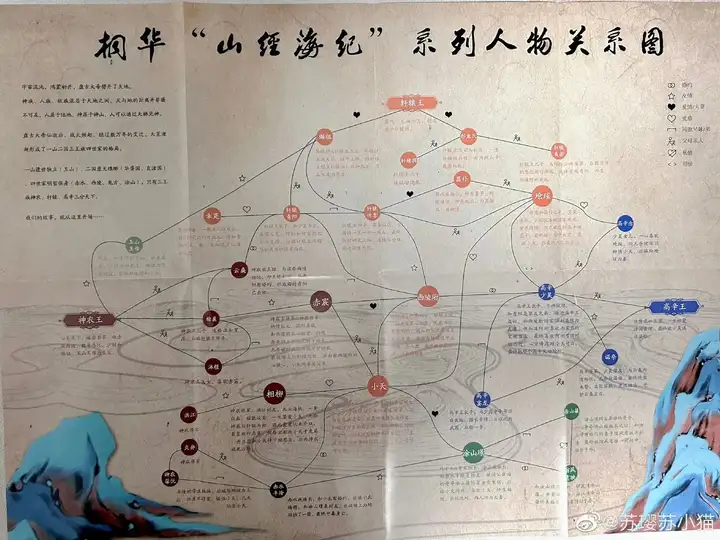
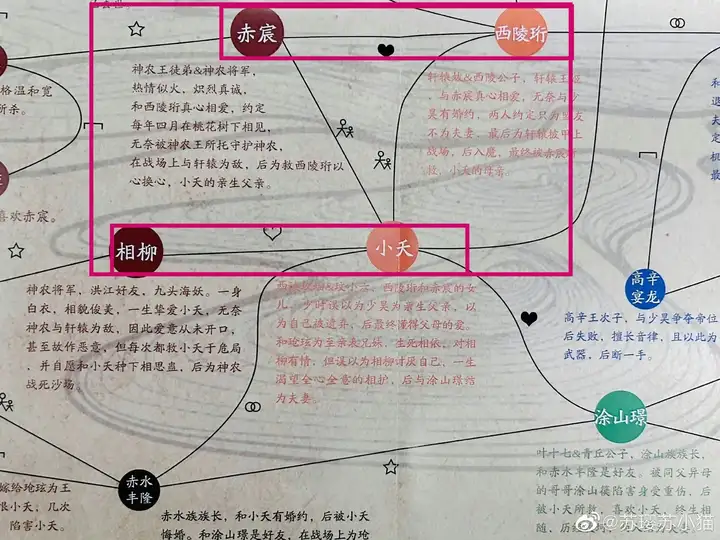 this is also the one who has the "Mountain and Sea Broker" relationship chart~
this is also the one who has the "Mountain and Sea Broker" relationship chart~
This picture is full of the author’s desire to survive.
The line without Yun Sang and Nuo Nai is very regretful!
(Weibo: YOLO苏璎)
"Yaoliu double arrow"
1. <Yaoliu couple bracelet :>
Translate :
Tianliu·Taoyao Liumei Bracelet
Two- way secret love, falling in love with each other. What is lovesickness? What is lovesickness? The most lovesickness.
2.<Tencent Video Welfare Officer>
Xiaotian and Xiangliu: Love each other but dare not. They became friends because of medicine. They didn't know each other without fighting. They seemed to be incompatible, but in fact they cared about each other. They hid their feelings, but they only let themselves down.
Tencent Video
Sauvignon Blanc
This was the introduction to the original electronic version of the book, but when it was adapted into a TV series, it was immediately changed.But everything comes first , and the first is the purest and truest...
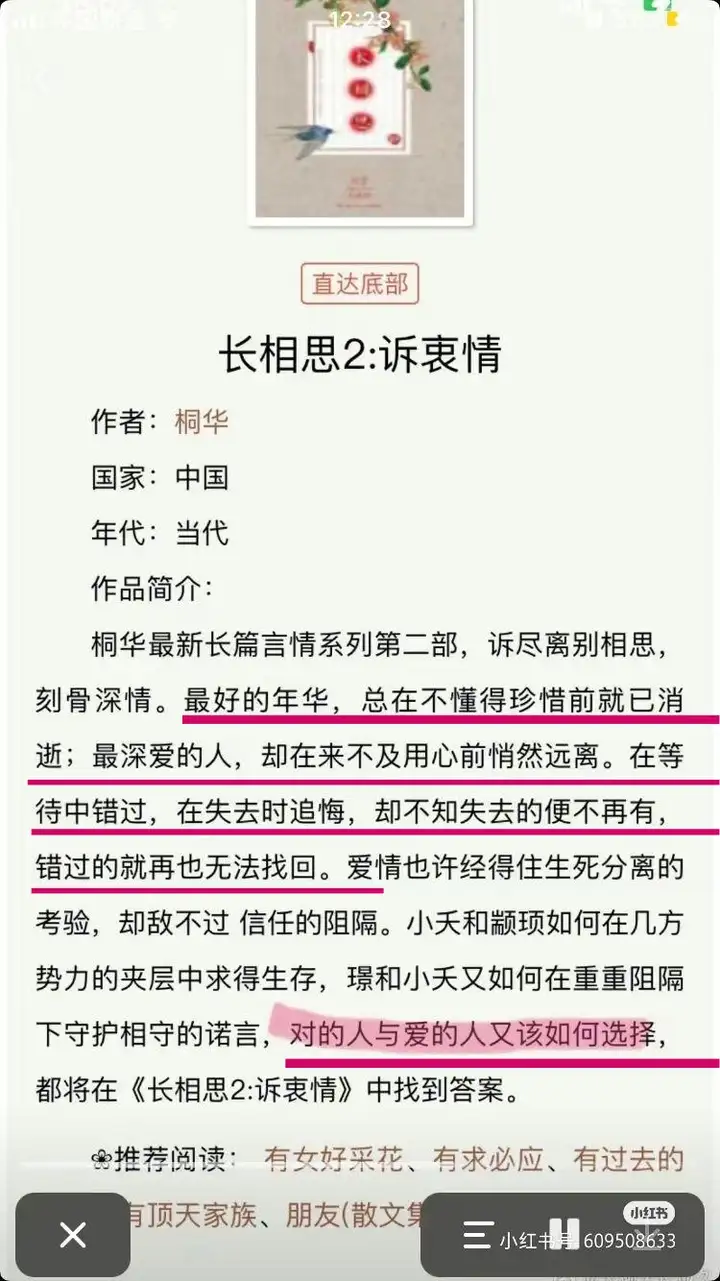
Translate :
Author: Tong Hua
Straight to the bottom
Sauvignon Blanc 2: Telling the Heart
Country:China
Era:Contemporary
introduction:
The second part of Tonghua's latest long- form romance series, telling the story of separation and lovesickness,Deeply affectionate. The best years are always gone before you know how to cherish them.
Pass away; the person you love most quietly leaves you before it's too late.
Waiting I missed it while I was waiting, I regretted it when I lost it, but I didn’t know that what I lost was no longer there.
What is missed can never be found again. Love may withstand the separation of life and death .
Test, but no match for the barrier of trust. How do Xiaotian and Zhuanxu get along with each other?
To survive among the layers of forces, how do Jing and Xiaotian survive the numerous obstacles?
Making a promise to protect each other, how to choose the right person and the person you love?
You will find the answers in "Sauvignon Blanc 2: Telling the Heart".
Recommended reading: There are women who like to pick flowers, respond to requests, and have pasts. There are Dingtian family and friends (a collection of essays)
Now this is an electronic introduction after the drama version came out, so what charm does " Sauvignon Blanc " have after it has been changed again and again ? It will be a bad street from now on, who will care about it? Anyway, I don’t care about it anymore…
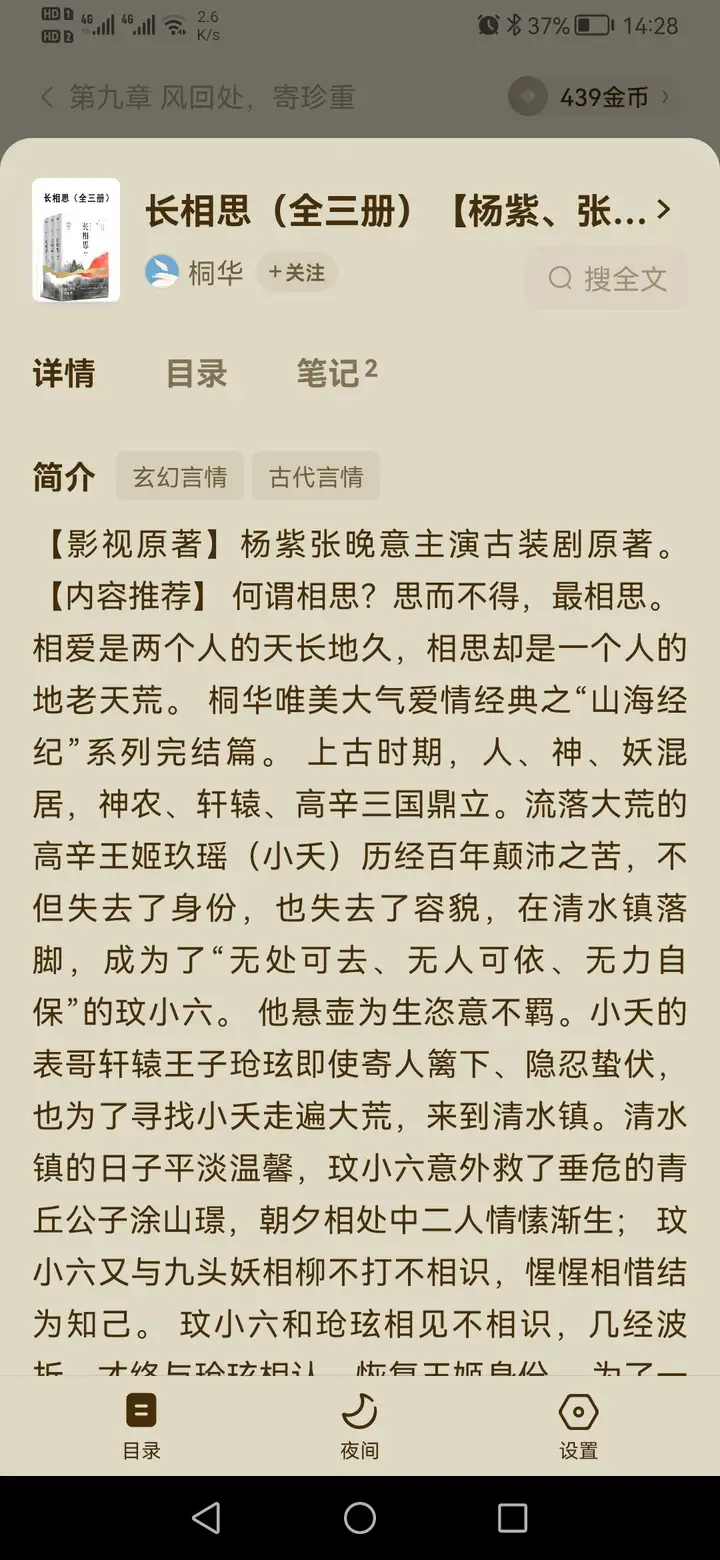 translete :
translete :
Prime Minister (all three volumes)
Sauvignon Blanc (all three volumes) [Yang Zi, Zhang...>
●Tonghua+Follow
Q Search full text
Details
Table of Contents Notes 2
Introduction
fantasy romance
ancient romance
[Original work of film and television] Yang Zi and Zhang Wanyi star in the original work of the costume drama.
[Recommended content] What is lovesickness? The most lovesickness is missing one. Falling in love lasts forever for two people, but missing each other lasts forever. The final chapter of the "Mountain and Sea Brokerage" series of Tonghua's beautiful and atmospheric love classics. In ancient times, humans, gods, and demons lived together, and the three kingdoms of Shennong, Xuanyuan, and Gaoxin stood in power. Ji Jiuyao (Xiaotian), the king of Gaoxin who lives in the wilderness, has gone through hundreds of years of hardship. Not only has he lost his identity, but also his appearance. He settled in Qingshui Town and became "nowhere to go, no one to rely on, and unable to protect himself." Wen Xiaoliu. He makes a living by hanging pots and is uninhibited. Xiaotian's cousin Xuanyuan Prince Qianxuan traveled all over the wilderness to find Xiaotian and came to Qingshui Town even though he stayed under the shelter of others and hid in hiding. The days in Qingshui Town are ordinary and warm. Wen Xiaoliu accidentally saves the dying Qingqiu Master Tu Shanjing, and the two gradually fall in love with each other day and night; Wen Xiaoliu and the nine- headed demon Liu Buda are not acquainted with each other, and they cherish each other and become close friends. Min Xiaoliu and Zhenxuan met but did not know each other, and they had many twists and turns.
This is what Tonghua himself said about Xiaoyao’s choice based on psychological shortcomings,Not because Love.
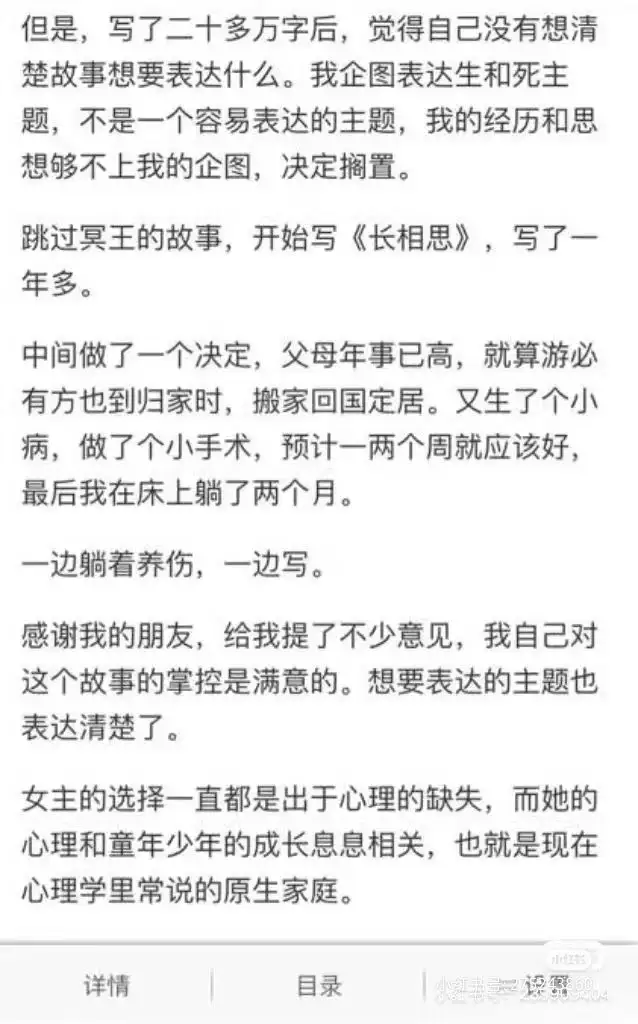
Translate :
However, after writing more than 200,000 words, I felt that I had not thought clearly about what the story wanted to express. My attempt to express the theme of life and death is not an easy subject to express. My experience and thoughts are not up to par with my attempt, so I decided to shelve it.
I skipped the story of Pluto and started writing "Sauvignon Blanc", which took more than a year.
A decision was made in the middle. My parents were getting old, and even if they had enough time to travel, they would move back to their country to settle down. I had another minor illness and had a minor operation. It was expected to be cured in a week or two. In the end, I stayed in bed for two months.
I wrote while lying down recovering from my injuries.
Thanks to my friends who gave me a lot of advice. I am satisfied with my control of this story. The theme I want to express is also clearly expressed.
The heroine's choice has always been due to psychological deficiencies, and her psychology is closely related to the growth of childhood and teenagers, which is what is often called the original family in psychology today.
" THIS IS YAOLIU "
BOOK COVER SAUVIGNON BLANC
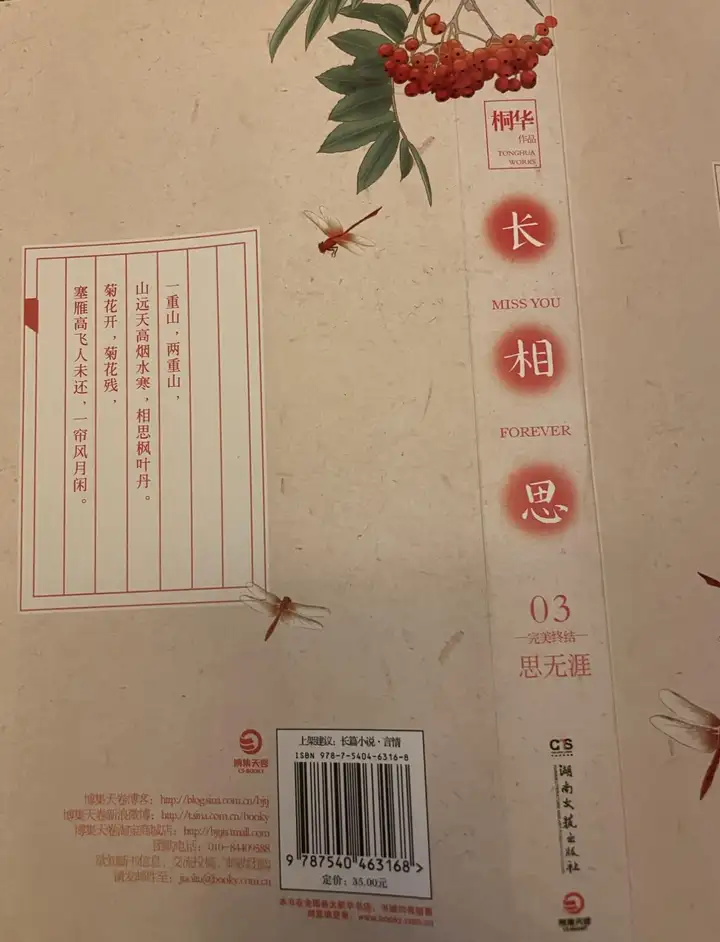
Translate :
"Sauvignon Blanc: One Mountain" (Li Yu)
One mountain, two mountains. The mountains are far away, the sky is high, the smoke is cold, and the water is cold. I miss the red maple leaves.
The chrysanthemum blooms, the chrysanthemum dies. The flying geese have not yet returned, and the wind and moon are idle behind the curtain.
^^
I miss the maple leaves like flames, and I remember them hard in the autumn, but the person I miss has not come back.
[His hair returned to white, hanging down casually, like flowing clouds. Behind him was a maple tree , its frosty leaves blazing red, making him as bright as snow and as pure as clouds, without any shadow. ] (The maple tree is the maple tree . The meaning of the maple leaves is to symbolize a beautiful and affectionate lover. The color of the maple leaves is bright and the shape of the leaves is similar to the heart shape, so its meaning is affection.), ( A Curtain of Love ) is the scene that runs through the whole text. -The moon belongs to Yao Liu. As long as they are together, they are almost inseparable from the moon , such as embracing each other under the moon for 37 years at the bottom of the sea, holding hands on Hulu Lake to watch the rising moon on the sea, etc.!
" THIS IS YAOLIU "
BOOK COVER SAUVIGNON BLANC
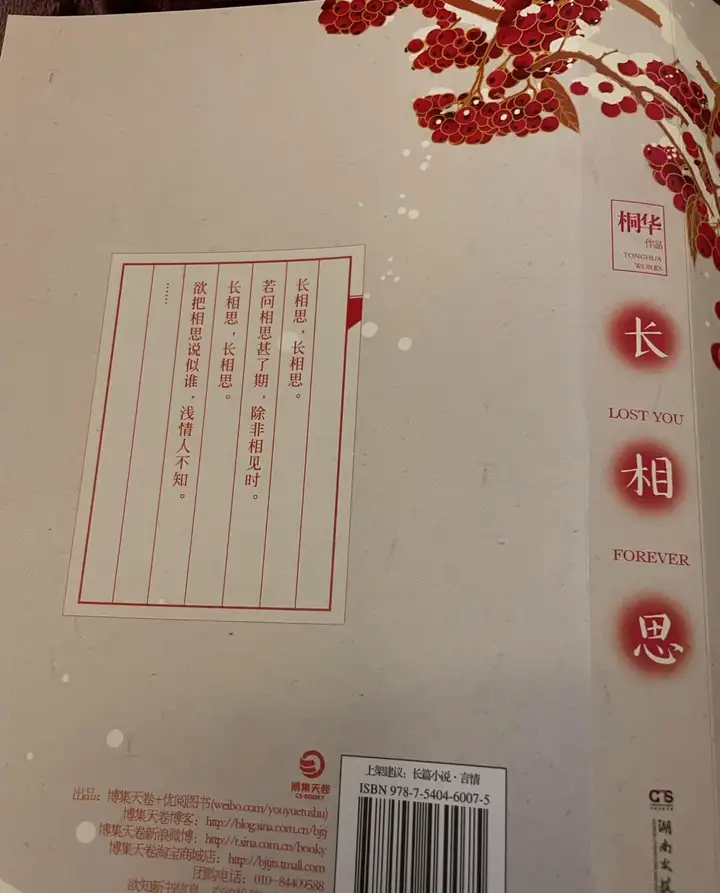
Translate :
"Sauvignon Blanc·Sauvignon Blanc" (Yan Jidao)
Sauvignon Blanc, Sauvignon Blanc. If you ask about how long your lovesickness lasts, it won’t be until you meet each other.
Sauvignon Blanc, Sauvignon Blanc. Who do you want to describe your lovesickness like? Lovers don’t know.
When does lovesickness end, unless it is when we meet.
Who can listen to the love story? A ruthless person cannot understand it.
" THIS IS YAOLIU "
BOOK COVER SAUVIGNON BLANC
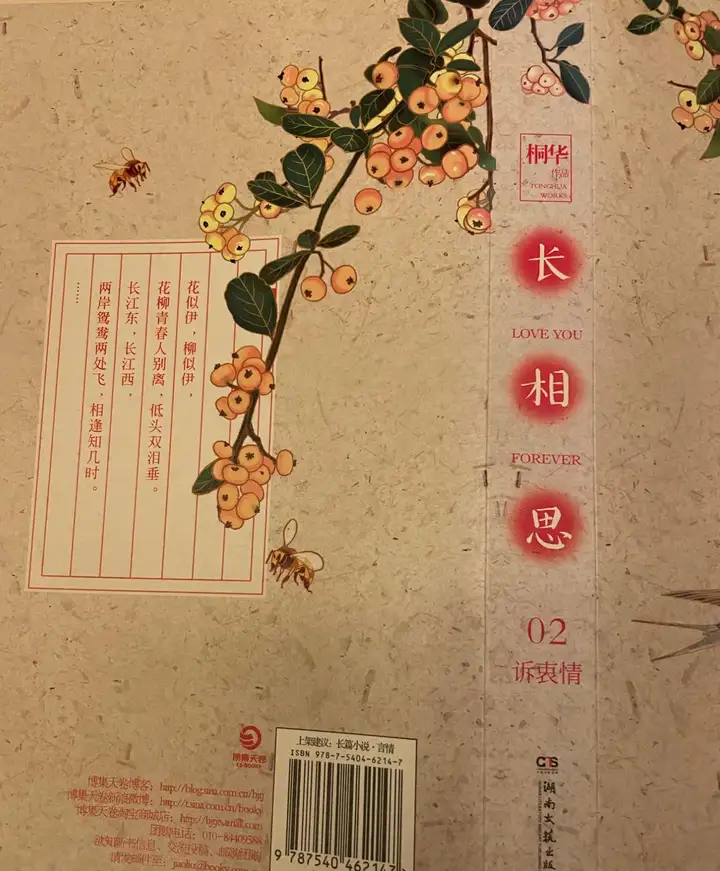
Translate :
長相思 Long lovesickness by Ouyang Xiu
蘋滿溪, Brook full of clover fern
柳繞堤, Willows all over the dike
相送行人溪水西,Like a melancholy stream when sending someone off
回時隴月低。 The moon hang down the way home
煙霏霏, Mist falls fast and thick
風凄凄, Wind drags sorrowfully
重倚朱門聽馬嘶,Lean against the vermilion gate, listening to the horse's neigh
寒鷗相對飛。 Cold gulls fly toward each other
"Sauvignon Blanc·Flowers Like Yi" (Ouyang Xiu)
Flowers are like Yi, willows are like Yi, flowers and willows are like Yi, when young people part with flowers and willows, they lower their heads and shed tears.
To the east of the Yangtze River and to the west of the Yangtze River, mandarin ducks fly in two places on both sides of the Yangtze River. You know when they will meet.
Lover's gu ~The upper que is written as farewell, and the lower que is written as farewell. It writes about a couple who separated in their youth. After the separation, the wife misses her husband endlessly, but the lovers fly in different places like mandarin ducks, not knowing when they will meet again.
At the beginning, Tong Hua wrote about Yao Liu's love for each other. The poster in the book is of Yao Liu, and there are also Xiang Liu's classic lines written on the cover. The character introduction of Xiao Yao is "having feelings for Xiang Liu" and "how to choose the right person and the one you love."
All kinds of clues prove what her original intention is. After the book was published, it was discovered that Yao Liu and Yao Jing had such a quarrel. For the sake of popularity and to carry water, they deleted all of this.
Now she doesn't admit Yao Ai Liu, nor does she deny Yao Ai Liu. Whenever she asks, she will slap Yao Liu and Yao Jing, so she can continue to argue. She won't offend anyone.
Recent Discussions
-
BL Drama Lovers Club3 minutes ago - PaiSkyForever
-
Xiang Liu and Xiao Yao’s Story and Romance11 minutes ago - blabla100
-
Fan Fiction Thread for Lost You Forever20 minutes ago - Kokuto
-
Deng Wei - A Daily Picture Show31 minutes ago - Symbolika1
-
Tushan Jing & Xiao Yao Love Story Aesthetics36 minutes ago - Symbolika1
-
°Tushan Jing & Xiao Yao FAN ART Candy store (*,*)°38 minutes ago - Symbolika1
-
Tushan Jing and Xiao Yao, here's to a Happily Ever After40 minutes ago - Symbolika1
-
Last Rock/Metal Asian song that u listened to?44 minutes ago - cAlex
Hottest Discussions
-
Keep a word, drop a word #28 hours ago
-
Word Association #44 hours ago
-
✰ Last letter food game ✰4 hours ago
-
♥️Count to 7000000♥️3 hours ago
-
10 dramas/movies with ____? #423 minutes ago


